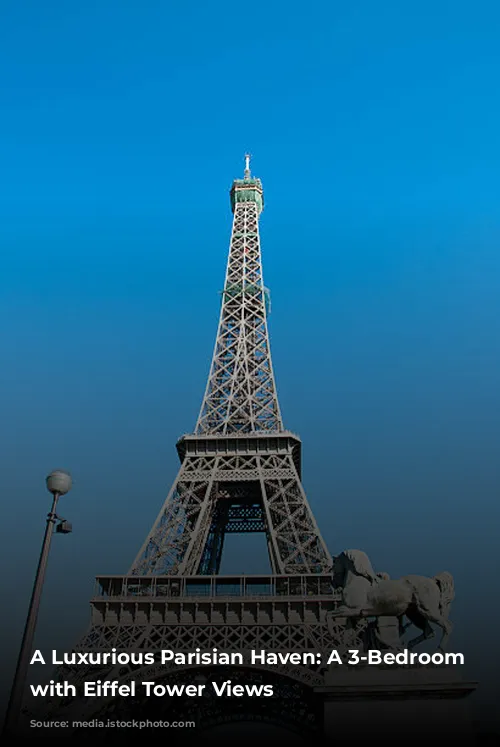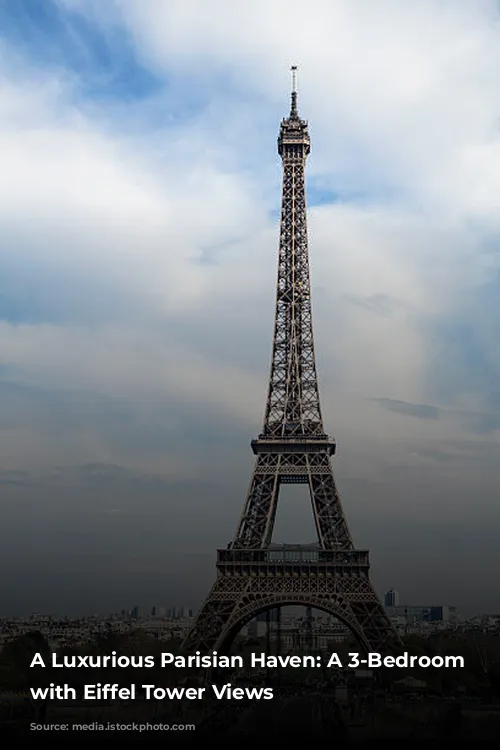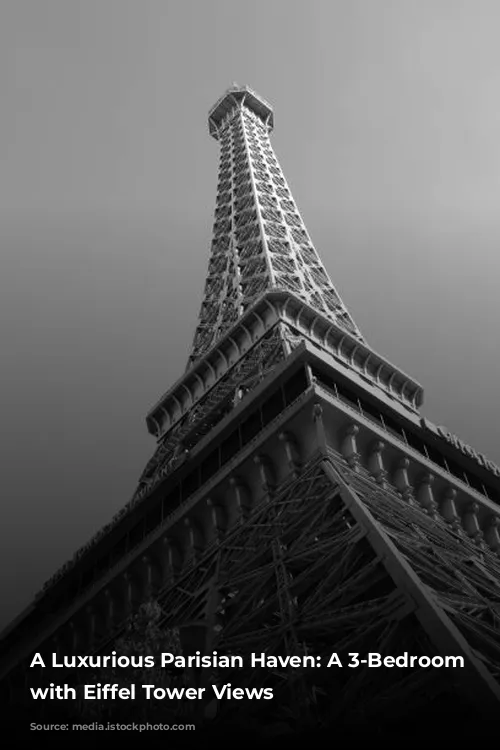Imagine waking up to breathtaking views of the iconic Eiffel Tower every morning. This stunning 3-bedroom, 3-bathroom apartment on the 4th floor offers exactly that. The property boasts 139 square meters of beautifully remodeled space, never lived in and waiting for its new owners.
Located in a grand, ornate Haussmannian building with an elevator, this apartment is a true gem. The building itself is a sight to behold, with its impressive common areas and a prime location on a quiet, tree-lined avenue. The apartment’s corner location offers unparalleled views, with French doors opening onto balconies that frame the Eiffel Tower in all its glory.
Step inside and be captivated by the historical charm. The apartment features meticulously restored herringbone wood floors, elegant moldings, and classic fireplaces. The modern, fully equipped kitchen boasts extensive stone countertops and a spacious layout perfect for entertaining. With each of the three large bedrooms featuring its own en-suite bathroom, this apartment provides the ultimate in luxury and comfort. A cellar is also included.

The 7th Arrondissement: Parisian Elegance and Charm
The 7th arrondissement is a true embodiment of Parisian elegance. Known for its charming neighborhoods, beautiful parks, and central location, it’s no wonder the 7th is one of the most sought-after addresses in Paris.
Each neighborhood has its own distinct character. While areas near the Champs de Mars and the 6th arrondissement are renowned for their prestige, the neighborhood bordering the 15th exudes a peaceful, residential feel. Imagine strolling through the gardens of the Rodin museum on a sunny day or enjoying a picnic in the shadow of the Eiffel Tower on the Champ de Mars.
The vibrant Rue Cler is a foodie’s paradise. With its abundance of fresh produce, meats, cheeses, breads, spices, and bustling sidewalk cafes, it’s a delight to explore. The 7th arrondissement is also home to numerous government offices and ministries, including the Assemblée Nationale, the seat of the French parliament.
Despite its central location and spacious apartments, the 7th arrondissement is one of the most expensive areas in Paris, second only to the 6th. The Carré des Antiquaires, a neighborhood known for its prestigious boutiques and art galleries, is particularly sought after. The high demand for real estate in the 7th, fueled by both foreign investors and local buyers, has driven prices to stratospheric levels. The areas around the Champs de Mars, Invalides, and Rue Cler, especially those with views, command the highest prices.

A City Shaped by Walls: Parisian Architecture Through the Ages
Paris’s architectural evolution is a fascinating journey through time, reflecting the city’s growth and development. The city evolved from a walled settlement, a fact that many historians believe has given Paris a unique sense of order compared to cities like London and Boston.
Paris has always been surrounded by walls. Even today, the Péripherique highway acts as a modern-day wall, echoing the legacy of the 12th-century wall built by Philippe August. This continuous cycle of building and rebuilding walls has created a spiraling city, expanding outwards from the Ile de la Cité.
The city’s growth was rapid, particularly in the 19th century. By 1853, Paris had over a million residents, yet only one in five homes had running water, with most plumbing confined to the ground floor. Napoleon III, seeking to modernize Paris, enlisted the help of Baron Haussmann to redesign the city. Their ambitious plan aimed to improve traffic flow by creating wide boulevards, enhance hygiene with a clean water and sewage system, and provide housing for the burgeoning upper class.
The Haussmannian style, characterized by intricate cut-stone facades, became synonymous with Parisian architecture. Typical Haussmannian buildings feature large apartments with multiple reception rooms, elegant marble fireplaces, chevron parquet floors, high ceilings adorned with elaborate crown moldings, and grand stairwells with side-mounted elevators. This architectural style is prevalent throughout central Paris, particularly in the 8th, 10th, 14th, 15th, 16th, 17th, 18th, and 20th arrondissements.

The Art Nouveau Era: A Whimsical Embrace of Beauty
The Art Nouveau movement, a brief yet impactful architectural trend that flourished from 1893 to the beginning of World War I, added a touch of whimsy to the Parisian landscape. Hector Guimard, one of the movement’s most renowned figures, is best known for his distinctive “cigarette smoke” curved lines. While his work initially found favor in the elegant 16th arrondissement, his Art Nouveau style was rooted in a social conscience, reflecting the spirit of the Arts and Crafts Movement in Britain.
Guimard’s opportunity to design the city’s metro entrances in 1896 allowed him to create something beautiful for the masses. However, when he unveiled his brilliant Métro work in 1900, it was met with widespread disapproval. The shiny green color was deemed unpatriotic, too reminiscent of Prussian green, and the intricate metalwork was deemed too unusual for the public’s taste. Despite the initial criticism, time has proven Guimard’s vision, and his Art Nouveau Métro entrances have become iconic symbols of Paris.

The Rise of Art Deco: A Celebration of Modernity
The end of World War I marked a new era of optimism and exuberance in Paris. The world had just survived “the war to end all wars,” and a sense of freedom and progress permeated the air. The roaring twenties saw the rise of high-speed ocean liners, Surrealism revolutionized the art world, and jazz music filled the airwaves. The Modern Age had arrived.
Architects, seeking to express this new spirit of modernity, responded with angular shapes reminiscent of the sleek cruise ships of the time. This style, known as Art Deco, embraced the jazzy rhythms of the era. World War II brought an end to Art Deco’s optimistic spirit, and the less flamboyant lines of pure Modernism took over. Many factories built during this period have since been converted into residential spaces.
Converting a loft into a livable space requires careful planning and often involves consulting an architect. While remodeling the interior of a loft generally does not require approval from building co-owners, any changes affecting the exterior of the building will need to be approved by both building co-owners and city officials.

A Culinary Journey Through the Arrondissements: A Personal Guide
The culinary scene in Paris is legendary, with countless restaurants offering a symphony of flavors and experiences. While many guides offer extensive lists of places to eat, we’ve compiled a personal selection of our favorite spots in each arrondissement.
From swanky restaurants requiring reservations to casual eateries, we’ve got something for every taste and budget. If you have any hidden gems you’d like to share, please let us know so we can add them to our site!
For a truly authentic French experience, head to Christian Constant’s casual restaurant. With no reservations required, you can indulge in delicious, traditional French cuisine in a relaxed yet elegant atmosphere. Most dishes are served in Staub cocottes, and the quality is consistently excellent, making the wait worth it, even if it means arriving after 8pm. For a more formal affair, try Constant’s flagship restaurant, Violon d’Ingres, or his casual Cafe Constant, both located next door.
For a taste of modern French cuisine, visit the Thoumieux Hotel’s brasserie. Chef Jean-François Piege, renowned for his two Michelin stars and the title of Top Chef France, and his associate Thierry Costes, have created a unique space where creative French cuisine is served in a relaxing, colorful ambiance. With its plush seating and pop-art decor, this brasserie is a feast for both the eyes and the palate.
